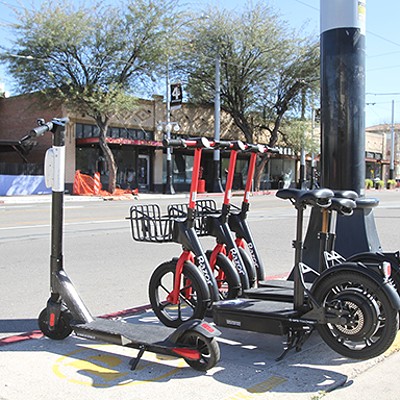Though funny, Kurt Weinrich possesses none of the cockiness or pretense of Stanley Motss. He has the right to the fictitious Hollywood producer's confidence, though, and shares Motss' rare capacity for remaining unruffled, for knowing the job can be done in the face of overwhelming and, at times, bizarre adverse circumstances.
He'll need it.
Weinrich has completed nine days as director of Pima County's troubled Transportation Department and Flood Control District, a job that pays $110,000 a year and has driven its two previous occupants to the shelter of city government where political interference is, by charter construction, less brazen. He arrives from Las Vegas as Pima County scrambles to get back on track with a $350 million transportation bond program that, the Board of Supervisors assured voters in 1997, would unclog chronically overcrowded roads in metropolitan Tucson.
Planning and construction are three years behind schedule.
And the price tag of the roads that bond revenue was to build has doubled. At $700 million, the county is trimming, delaying or canceling projects within the city of Tucson. These are the very projects deemed necessary to entice voters four years ago, to buy support from the City Council and to silence critics.
"You think this is tough? I was four months into the production on The Song of Solomon when I found out I didn't have the rights. You think this is tough? This is nothing. Nothing." -- Stanley Motss
Weinrich does not talk that way. He could. He has the talent and the experience. He has worked where demands are greater. He fought these fights on an accelerated and amplified basis in Las Vegas as the director of the Regional Transportation Commission for Las Vegas, Clark County and smaller communities. It was a constant uphill battle in the nation's fastest-growing community--6,000 net new residents per month.
While we struggle with the severely underbuilt roads that are part of the 56 projects marked in the bond plan--and a mere 10 percent have been completed--Las Vegas was in worse shape. Movement on the Strip, which is outside the city, is a crawl. Most Las Vegans accept it. But getting around town, on either Interstate 15 or surface streets, has been a nightmare.
Drive past Tucson's downtown on I-10 and you are operating one of 145,000 cars, trucks or motorcycles streaming in that span every day. Weinrich, as the transportation planner and manager, faced similar constraints and higher volume on Tropicana Avenue and Flamingo Road, two Las Vegas surface streets.
Weinrich suffered the commutes, too. He and his family settled in Nevada's Boulder City when they fled Chicago winters and when his career advanced from a local position to the Regional Transportation Commission. His time behind the wheel was short, long and then shortened through road improvements.
Even when moving on road projects, Pima County has stumbled. The county and its contractors tried to relieve the horrific congestion on Thornydale Road, but residents throughout the valley were horrified when crews slaughtered protected ironwood trees. It was doubly embarrassing for the county officials--particularly presumptive environmentalist Raúl Grijalva, a Democrat--who castigated Tucson developer Joe Cesare when workers cut down some palo verde trees in a wash on his property northwest of River and Oracle roads more than 10 years ago.
Weinrich points no fingers in assessing county bungling in road financing, the bond schedules, canceled bond sales and the environmental damage.
In his understated, calm tone, he says only that it "sounds like there are some management problems."
WEINRICH IS THE SON of World War II refugees. He was 2 when his family emigrated from Austria to Cleveland 50 years ago. His father worked for 33 years in the General Motors Fisher Body plant there. After graduating from Cleveland State University, Weinrich worked as an assistant city engineer for a suburb before moving on to Chicago for several suburban government jobs in traffic and city engineering and public works. He then served as city engineer for Boulder City, the community created for the builders of Hoover Dam.
After two engineering posts, traffic and design, with Clark County, Weinrich became director of the Regional Transportation Commission, a panel that looks like the Pima Association of Governments but wields more power that the regional council here.
Weinrich speaks in detail of the nuances of that agency, the roads it needed to build and how, and the buses it needed to add. Transit-happy residents here take note: Weinrich's Nevada crew nearly tripled the number of buses, and yearly ridership boomed from 6 million to 54 million.
Pima County officials above Weinrich are neither troubled by the ballooning costs of their transportation plan, sold to voters who backed the 1997 bond program, nor worried about the lack of money. In fact they almost welcome it as an excuse to drive home their demand for more money from sales taxes, gas taxes or sales taxes on gas alone.
County Administrator Chuck Huckelberry, a former county transportation director, has used the money problems to highlight the need for diversified revenue streams. This shortfall, Huckelberry said on Weinrich's fourth day on the job, shows that a simple bond won't cut it. The county will forever be behind and motorists stalled.
Votes have slammed two proposals for transportation improvements to be financed by a sales tax. The first, for a road-heavy, $1 billion plan that included a patched outer loop, lost 57 percent to 43 percent in 1986. A second that included more transit, bike and walk paths, was crushed 61 percent to 39 percent in 1990. And a quarter-cent sales tax for jails and badly needed juvenile justice facilities lost 70 percent to 30 percent in 1994.
"Our three defeats have taught us that people are not upset enough to vote for something that is not directly user-related," Huckelberry said.
The region has $10.5 billion in transportation needs and only $4 billion in the pipeline.
New taxes, be they a sales tax on gasoline or a flat per-gallon gas tax, are needed. But both would need legislative approval.
"This is nothing. Did you ever shoot in Italy? Try three Italian starlets whacked out on Benzedrine and grappa. This is nothing." --Stanley Motss
In his time as a transportation czar in Las Vegas, the understated Weinrich worked with elected officials--local and state--to develop tax schemes that voters overwhelmingly recommended (voters there can't simply vote to tax themselves) to solve transportation problems. The blend includes six types of taxes, ranging from sales and gas taxes to new auto registration, aviation fuel taxes and hotel taxes. Each had specificity in how the money could be spent.
Besides the big gains in transit, the results have included new streets and a beltway to get people around Las Vegas.
The money slump in Tucson also has the county looking to delay projects within the city, a move that comes three months after the Board of Supervisors pulled $10 million from a project to widen 22nd Street from I-10 to Park Avenue. The city failed to earmark its share, and supervisors moved the money to neighborhood projects on the south side. Meanwhile, relations between the city and county governments have dropped to absurdly low levels, with Republican Mayor Bob Walkup and other city officials moving to seek a city-only sales tax for roads next spring.
"This is nothing. Nothing. This is a walk in the park." -- Stanley Motss
Weinrich was lured to Tucson by a headhunter. He is filling a vacancy in the county's top transportation job that was shored up temporarily by Ben Goff. Brooks Keenan left the job after complaining that Grijalva and others had improperly pressured him to rig contracts. Keenan now has one of the top-level transportation jobs at the city, where one of his county predecessors, Tony Paez, is the outgoing director of transportation.
Republican Supervisor Ray Carroll, who pushed for investigation of Keenan's charges, said he was pleased that the new director is from the "outside." He has not yet met Weinrich, but says expectations should be high given his experience and the extensive experience of his two superiors, Deputy County Manager John Bernal and Huckelberry.
"I just hope this guy doesn't have too many chiefs," Carroll said.
Huckelberry touts Weinrich's experience on "regional transportation issues. He has the ability to bring groups together, be it governments or business."
It was a flashy Las Vegas transportation fix--the light rail, monorail or fixed guideway system--that eventually put Weinrich on the side opposite powerful casino (politely called "resort") owners and the politicians they sponsored. It led to his departure and an interim job with a national engineering consulting firm.
In the complicated and costly planning for rail, Weinrich did not want to exclude proposals and did not want to foreclose any designs or technology. But the MGM and Hilton resorts wanted to expand the monorail they had created with two used Disney cars--the ones that carried 5 million passengers a year between the two properties. Fights ensued about the public-private nature of a full-blown rail or high-tech system for the Strip. Weinrich raised questions about the safety of the casinos' monorail for full-fledged traffic that should extend the length of the Strip to the airport.
Arguments were simplified to issues of control. Weinrich lost when casino-backed candidates won city office.
He's far from bitter and instead speaks, in detail, of his accomplishments in Las Vegas traffic planning.
Huckelberry and others also see that part of Weinrich's experience as valuable.
He has been through the battles. He has emerged as one not easily impressed or intimidated.
Pima County? This is nothing. Nothing.











